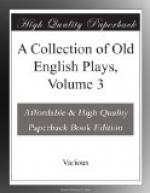Goos. Why sir Cut. thats Poetica licentia, the verse wood have bin too long, and I had put in the third. Slight, you are no Poet I perceive.
Pene. Tis excellent, servant.
Mom. Keepe it Lady then, And take the onely Knight of mortall men.
Goos. Thanke you, good my Lord, as much as tho you had given me twenty shillings in truth; now I may take the married mens parts at football.
Mom. All comforts crowne you all; and you, Captaine, For merry forme sake let the willowe crowne: A wreath of willow bring us hither straite.
Fur. Not for a world shood that have bin forgot Captaine it is the fashion, take this Crowne.
Foul. With all my hart, my Lord, and thanke you too; I will thanke any man that gives me crownes.
Mom. Now will we consecrate our ready
supper
To honourd Hymen as his nuptiall rite;
In forme whereof first daunce, faire Lords and Ladies,
And after sing, so we will sing, and daunce,
And to the skies our vertuous joyes advance.
The Measure.
Now to the song and doe this garland grace.
Canto.
Willowe, willowe, willowe,
our Captaine goes
downe:
Willowe, willowe, willowe,
his vallor doth
crowne.
The rest with Rosemary we
grace;
O Hymen let thy
light
With richest rayes guild every
face,
and feast harts
with delight.
Willowe, willowe, willowe,
we chaunt to the
skies;
And with blacke, and yellowe,
give courtship
the prize_.
FINIS.
NOTE.—In a letter to the Athenaeum of June 9, 1883, Mr. Fleay suggests that Sir Giles Goosecap is the work of George Chapman. “It was produced by the Children of the Chapel, and must therefore date between 1599 and 1601. The only other plays known to have been represented by the Chapel Children are Lyly’s Love’s Metamorphosis and the three Comical Satires of Ben Jonson. The present play bears palpable marks of Jonson’s influence.... The author, then, must have been a stage writer at the end of the sixteenth century, probably a friend of Jonson’s, and not surviving 1636. The only known playwrights who fulfil the time conditions are Marston, Middleton, and Chapman. Internal evidence, to say nothing of Jonson’s enmity, is conclusive against Marston and Middleton. Chapman, on the other hand, fulfils the conditions required. He was Jonson’s intimate friend, and died in 1634. In 1598 he was writing plays for Henslow at the Rose Theatre; on July 17, 1599, his connexion with the Admiral’s Company there performing ceased; and his next appearance in stage history is as a writer for the Children of Her Majesty’s Revels, the very company that succeeded, and was, indeed, founded on that of the Children of the Chapel




